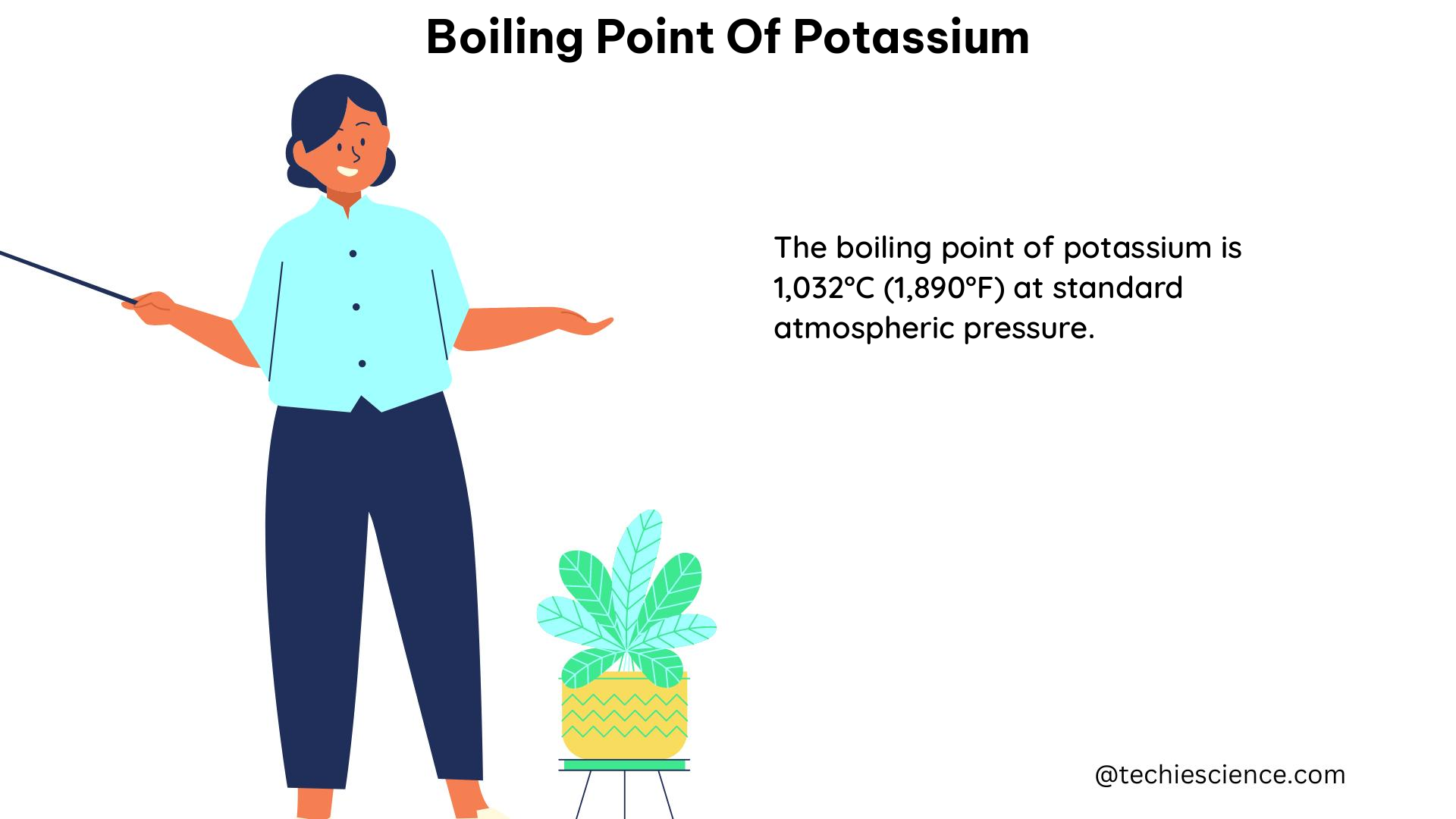The boiling point of potassium, a crucial physical property, has been extensively studied and documented by the scientific community. According to the National Institute of Standards and Technology (NIST), the boiling point of potassium is 756.5°C or 1393.7°F at standard atmospheric pressure. This value is the result of a comprehensive analysis of various experimental measurements and is widely accepted as the authoritative reference.
Understanding the Boiling Point of Potassium
The boiling point of a substance is the temperature at which the vapor pressure of the liquid equals the pressure surrounding the liquid, and bubbles of vapor form inside the liquid. This point is a characteristic property of a substance and is influenced by various factors, such as the strength of intermolecular forces, the molar mass of the substance, and the presence of impurities.
Theoretical Considerations
The boiling point of potassium can be understood using the principles of thermodynamics and kinetic theory of gases. The Clausius-Clapeyron equation, which relates the vapor pressure of a substance to its temperature, can be used to calculate the boiling point:
ln(P2/P1) = (ΔHvap/R) * (1/T1 - 1/T2)
where:
– P1 and P2 are the vapor pressures at temperatures T1 and T2, respectively
– ΔHvap is the enthalpy of vaporization
– R is the universal gas constant
By rearranging this equation and substituting the known values for potassium, the boiling point can be calculated.
Experimental Measurements
The boiling point of potassium can also be determined experimentally using various techniques, such as:
- Distillation: A sample of potassium is heated, and the temperature of the vapor-liquid interface in the distillation apparatus is measured to determine the boiling point.
- Vapor pressure measurements: The pressure exerted by the vapor above a sample of potassium is measured at different temperatures, and the boiling point is determined by extrapolating the data to the point where the vapor pressure equals the atmospheric pressure.
- Thermogravimetric analysis (TGA): A sample of potassium chlorate (KClO3) is heated, and the mass loss as a function of temperature is measured. The boiling point can be identified by the temperature at which the mass loss rate reaches a maximum, indicating the onset of boiling.
These experimental techniques have been used to confirm the boiling point of potassium and provide valuable data on the physical properties of this element.
Factors Affecting the Boiling Point of Potassium

While the boiling point of potassium is a well-established value, it is important to note that this property can be influenced by various factors, such as:
- Impurities: The presence of impurities, such as columbium or zirconium, in the condensed phase can affect the vapor pressure of potassium and, consequently, its boiling point.
- Solutes: The boiling point of a solution can be different from that of the pure solvent due to the presence of solutes, as described by Raoult’s law.
- Pressure: The boiling point of a substance is directly related to the surrounding pressure, as described by the Clausius-Clapeyron equation. Changes in pressure can result in changes to the boiling point.
It is essential to ensure that samples are pure and free from contaminants when measuring the boiling point of potassium to obtain accurate and reliable results.
Applications and Significance
The boiling point of potassium is a fundamental physical property that has numerous applications in various fields of science and technology, including:
- Chemical analysis: The boiling point can be used to identify and characterize substances, as well as to determine the purity of a sample.
- Thermodynamic calculations: The boiling point can be used to calculate other thermodynamic properties, such as the enthalpy of vaporization, which provides insights into the strength of intermolecular forces and the volatility of a substance.
- Material science: The boiling point of potassium is an important consideration in the design and development of materials and devices that operate at high temperatures, such as in the aerospace and nuclear industries.
- Educational purposes: Experiments involving the measurement of the boiling point of potassium can be used to teach students about the principles of chemical analysis, thermodynamics, and experimental techniques.
By understanding the boiling point of potassium and its relationship to other physical and chemical properties, scientists and engineers can gain valuable insights into the behavior and applications of this important element.
Conclusion
The boiling point of potassium is a well-defined physical property that has been extensively studied and documented by the scientific community. This value, 756.5°C or 1393.7°F at standard atmospheric pressure, has been confirmed through numerous experimental measurements and is supported by vapor pressure data. Understanding the factors that can affect the boiling point, as well as the various techniques used to measure it, is crucial for accurate characterization and application of this important element.
References:
- National Institute of Standards and Technology (NIST). (n.d.). Potassium: Boiling Point. Retrieved from https://webbook.nist.gov/cgi/cbook.cgi?ID=C7440-09-7&Units=SI&Mask=4#Thermo-Phase
- Naval Research Laboratory. (1963). HIGH-TEMPERATURE PROPERTIES OF POTASSIUM (Report No. AD0622190). Retrieved from https://apps.dtic.mil/sti/pdfs/AD0622190.pdf
- The Composition of Potassium Chlorate (Experiment). (2021). Chemistry LibreTexts. Retrieved from https://chem.libretexts.org/Bookshelves/Analytical_Chemistry/Supplemental_Modules_(Analytical_Chemistry)/Quantitative_Analysis/Gravimetric_Analysis/The_Composition_of_Potassium_Chlorate_(Experiment)
- The quantitative determination of potassium as the tetraphenylboron salt. (2021). RSC Advances, 11(51), 31692-31696. doi:10.1039/D1RA05837A

The lambdageeks.com Core SME Team is a group of experienced subject matter experts from diverse scientific and technical fields including Physics, Chemistry, Technology,Electronics & Electrical Engineering, Automotive, Mechanical Engineering. Our team collaborates to create high-quality, well-researched articles on a wide range of science and technology topics for the lambdageeks.com website.
All Our Senior SME are having more than 7 Years of experience in the respective fields . They are either Working Industry Professionals or assocaited With different Universities. Refer Our Authors Page to get to know About our Core SMEs.